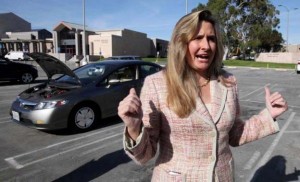Honda has filed an appeal of the small claim’s verdict that awarded nearly $10,000 to a California woman who had gone to court claiming her Civic Hybrid delivered significantly lower mileage than the maker had claimed.
One-time corporate attorney Heather Peters had taken the small claims route after opting out of a class action settlement that she felt enriched plaintiff attorneys, minimized the costs to Honda and left little for the actual owners of the first-generation Civic Hybrid.
“Two hundred dollars and a coupon? That was worth fighting,” she previously said.
A California judge awarded Peters $9,867 to cover the additional fuel used in her Civic Hybrid, along with the anticipated lower trade in value. By comparison, the class action settlement more recently approved by another California court will see about 200,000 owners receive between $100 and $200 in cash each, along with a coupon of up to $1,500 towards the purchase of another Honda.
Critics have argued that the settlement largely enriches the attorneys who took on the class action while helping Honda generate repeat sales. The settlement has been estimated by plaintiff attorneys to be worth between $87.5 million and $461.3 million – depending upon how many owners actually use the coupons. The court itself pegged the number at $170 million. It also approved $8 million in plaintiff attorney fees.
Despite accepting a settlement in the class action, Honda is trying to counter Peters’ claims that the Civic Hybrid delivered poor mileage.
In an appeals hearing in Superior Court, Honda presented testimony from a service manager at the maker’s Hollywood dealership claiming the car could reasonably achieve 53 to 55 miles per gallon, in line with the automaker’s original advertising.
But Peters countered by calling former Honda analyst and technical writer Jeffrey Holliday to the stand. He testified he “was not able to duplicate” the 50 mpg listed in Honda’s brochure and on its Munroney window sticker.
Peters’ husband further testified that the performance of the vehicle has been deteriorating and that it recently showed fuel economy of just 25 mpg. Peters herself testified the car’s performance is getting worse and that the vehicle now has trouble getting over hills.
A Honda lawyer, however, accused Peters of causing her own problems by driving aggressively, and pointed to wear on her tires to support that claim.
After winning her original victory, Peters encouraged other Civic owners to opt out of the class action settlement and take the case to small claims court. That approach has several advantages, including the relatively low cost and the fact that companies like Honda cannot bring lawyers into the courtroom. The downside is that verdicts are limited, depending on the state, to typically between $10,000 and $15,000.
About 1,700 other disgruntled Civic Hybrid owners have so far opted out and decided to fight the maker on their own – a key reason, it appears, that the maker has so aggressively launched its appeal of Peters’ initial victory.
An appeal of a small claims verdict can lead to significantly higher court-related expenses and can provide the opposition the chance to bring in their lawyers. Peters herself renewed her California law license to be able to fight Honda herself.
She admitted, after the day’s hearings, that she hadn’t anticipated the battle to drag on but insisted she is ready to keep fighting to get the full story out, saying, “My purpose is to hold Honda accountable for false advertising and to raise awareness.”
The hearing before Superior Court Judge Dudley W. Gray II will be Honda’s only chance to appeal the original verdict. The case is expected to wrap up by Friday and the judge expects to issue a ruling soon afterwards.

